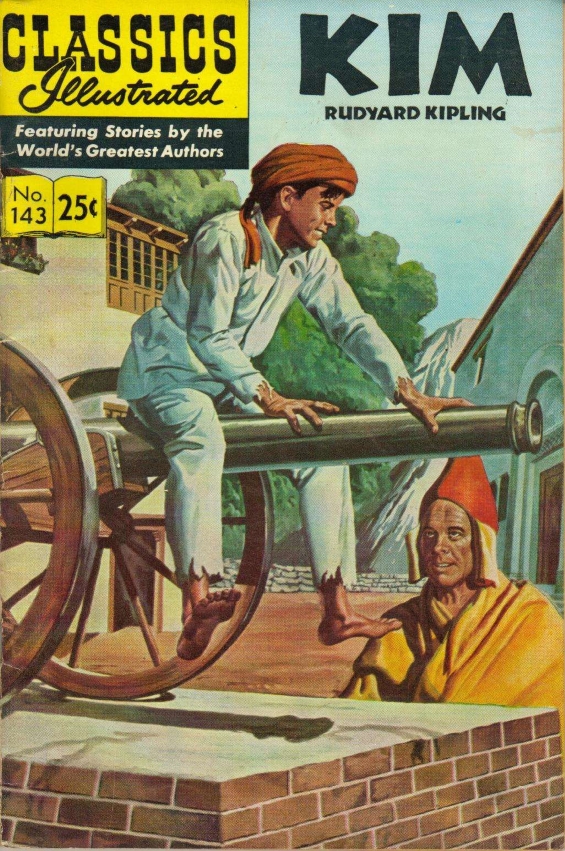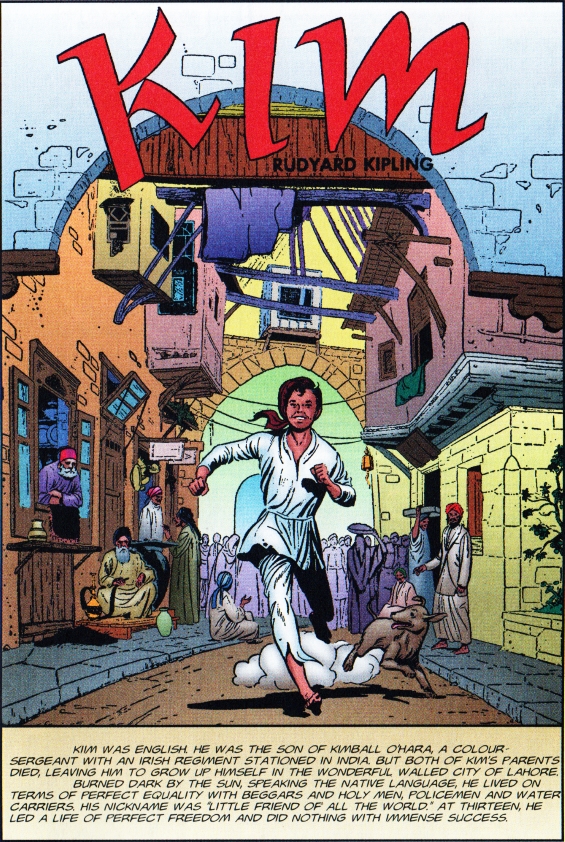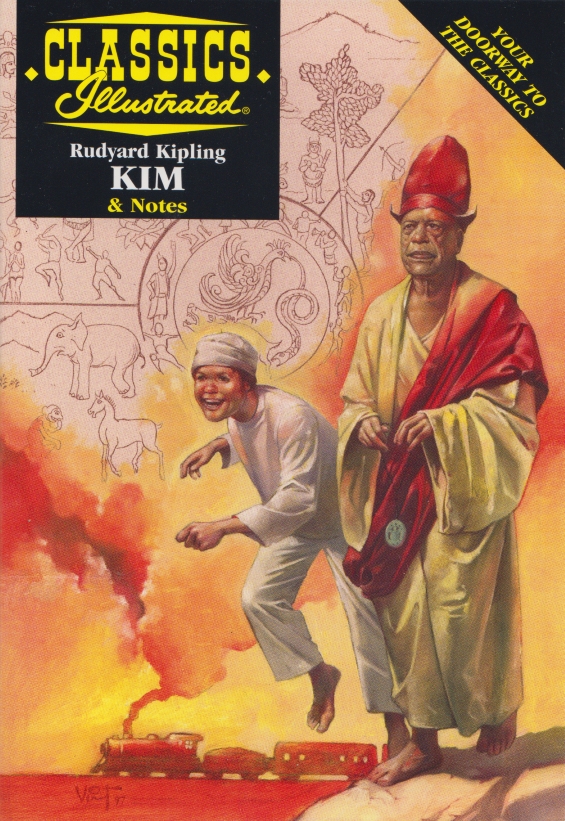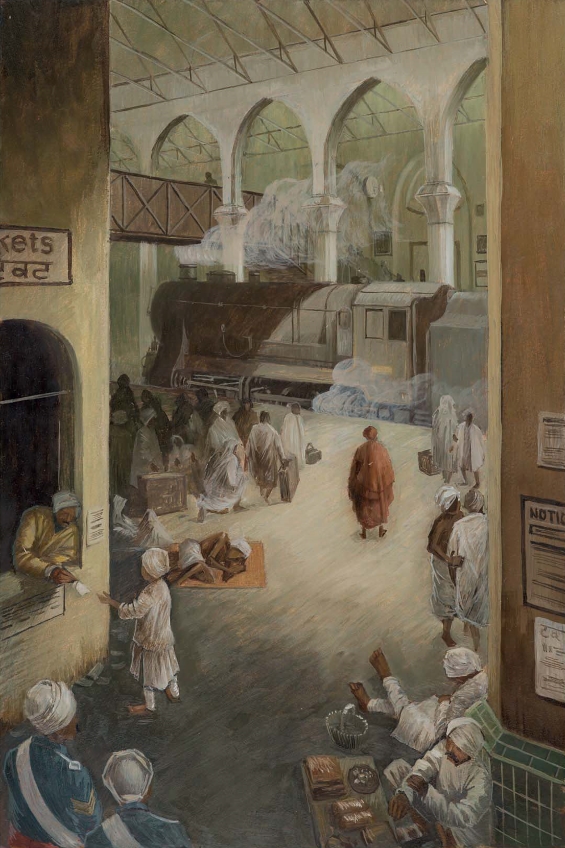
 The SFFaudio Podcast #483 – Jesse, Maissa Bessada, and Julie Davis talk about Kim by Rudyard Kipling
The SFFaudio Podcast #483 – Jesse, Maissa Bessada, and Julie Davis talk about Kim by Rudyard Kipling
Talked about on today’s show:
the Forgotten Classics podcast, 1901, 1900, a long book, a picaresque: “relating to an episodic style of fiction dealing with the adventures of a rough and dishonest but appealing hero”, a rogue, Mahbub Ali, how do we come to this book, Citizen Of The Galaxy is Julie’s favourite Heinlein, stuck in Julie’s brain, enchanted, so thick, so much going on, the clouds parted, the sights and sounds of India are overwhelming, reading Edgar Allan Poe on the page, a style, the big thick novels of today vs. the big thick novels of yesterday, more work to be done in a classic novel, thank you so much, we should talk about it, Jesse is a trickster, reading a book is a lot of work, dropping seeds and seeing if they flower, how could one not like this book?, The Turning Wheel by Philip K. Dick, was Philip K. Dick a Rudyard Kipling fan?, Galactic Pot-Healer by Philip K. Dick, do you like Yates?, I don’t know I’ve never tried any, do you like Kipling?, I don’t know I’ve never Kippled, Dick’s nod to Lovecraft, an existential crisis, The Man In The High Castle, comedic, jaded teenage students, the plot of Counter-Clock World, Red Dwarf: Backwards, Nodnol, Bulgaria, Chesterton on Dickens, seeing the world backwards, Dick handles it very tastefully, the United States as a Buddhist utopia, begging as a normal and honorable trade, a necessary trade, a very different kind of philosophy, does it depend on who is doing the begging, acquiring merit, catching meals, the author’s perception of Kim, India’s respect for the holy, big blinders, a lot of dialogue and clever wordplay, the 1950 movie adaptation of Kim, the movie was almost unwatchable, Kim is a malefactor, making babies cry, the opposite of ‘the friend of all the world’, stealing, smoking, Dean Stockwell as a small child, Errol Flynn as Ali, Gunga Din, The Jungle Book, racist!, Kipling’s love of India’s diversity, all races do the same thing in their own way, enlightenment and non-enlightenment, respect, Neil Gaiman, vindication!, understanding people from 100 years ago, he has a lot of race in his stories, how caste is everything, special clothing, entitled to certain kinds of respect, Kipling is interested in people, the real racists keep themselves away from the other, spending time with different groups, many merits, racist language, Kim chose the Indian/Tibetan way, the llama, layers, the contrasts between, the Anglican and the Catholic priests, different benevolent approaches, small touches, the River of the Arrow, Man’s desire for freedom from sin, an unrelenting desire, the protestant chaplin, in matters of human affairs the protestant church turns to the catholic church for guidance, loosely translating, a priest who cares about people, cute, trying to become pure, one thing that’s frustrating, so much going on, why the film version can’t work, Kipling’s playing a game with the reader, the whole Great Game aspect, did Kipling coin the phrase “the Great Game”?, everything’s in translation, Urdu, the flaw in what Jesse’s saying, thee not you, the relationship was formalized, Captain Arthur Conolly, exposing the actual workings of the spy system, if the empire of the world was controlled by Buddhism, Tim Powers’ Declare, the Russians and the British trying to control Asia, Declare is brilliant at times, counting magic, escaping the time in which a book is published, modern novel conventions, too long, spy novels, duplicates and doubles, the end of Kim, running out of strength, the third time through, a difficult book, when Kim appeared to be dying, how hard the book is, a kid’s book?, we’re just a lot weaker at reading than our ancestors, sustaining vigorous interest in sentences, why it’s hard to read Poe, its not that we’re incapable of it, looking at Reddit, what books today will be taught in school in twenty years, in Jack London’s lifetime, The King Of The Mazy May by Jack London, 1984, Fahrenheit 451, The Importance Of Being Earnest, The Hunger Games and Harry Potter, teaching candy, The Kite Runner, demanding kids dig deeper, catering to: reading can be fun!, Ready Player One will be taught in school?!, the worst kind of book for Jesse, Julie remembers Donna Summer, almost some nobility to the colonial system, good propaganda, Plain Tales From The Hills, writing for the English, many more of the flaws, the Raj exposed, I loved India, weaving an entertaining spy story throughout it, the spy runner, also an oddity, LibriVox, Adrian Praetzellis, the Naxos audiobook of Kim, good stuff on LibriVox, doing it for love, interpretations, how interesting Kipling’s life is, Kipling thought of himself as a Hindu for the first five years of his life, Kipling’s father was really talented, a documentary about Kipling’s father on YouTube, Kipling’s father was more of a traditional racist, Kipling was an outsider amongst the white people, sent away to boarding school for 11 years, Lahore is now in Pakistan, thick glasses, balance issues, he’s short, the seventy white people who run Lahore, night walks, H.P. Lovecraft, when the night comes to life, smoking opium, the bridge between the white people and the vibrant and fascinating natives, he felt as if he was a prince returning to their own land, like the maharajas who were sent to Eton and returned to India, abused in boarding school, that happens in this book too, mother and sister and aunty, fixing this lull, The Secret Of The Machines, told from the point of view of machines, the things that run modern civilization, we don’t care if you get caught in the gears, the story of robots, a science fiction writer, an inventor of many kinds of writing, Reading, Short And Deep, The Mark Of The Beast, a werewolf story, British drunkards who defile a Hindu god, the Silver Man, going barking mad, the European werewolf story in Colonial India, My Own True Ghost Story, someone is playing billiards next door, like Dickens, telling the story of the people, The Phantom ‘Rickshaw, The H.P. Lovecraft Literary Podcast, learning to write for the newspapers, the Mark Twain of India, among the cast of thousands, Mahbub Ali, he’s got real influence, its his job to beg, another Catholic connection, its about intention, like the llama, not earning merit, giving alms, St Thomas Aquinas, the poor are always with us, omnipresent, beggars on the road, only giving to the people you know, do you see Christ in them?, giving them great merit, when the llama allows the boy to be trained in the ways of the sahib, becoming a healer, a boy given a gun, the military caliber, a box of healing things, quinine, make a charm for this disease, equivocating, continually struggling, when we get to our Heinlein novel, the modern problem, the old wise men who guide the younger main characters tend to be pontifical rather than self-doubting, Jesse’s grandmother had just finished reading the book, a TV movie withe Peter O’Toole as the llama, is this really a children’s book?, Kimball O’Hara, the choices that Kim made once he understood his place in society, the ways of his childhood, the English couldn’t take it out of him (unlike Kipling), a university dean, lecture tours, marriage, using English in thinking, hypnotism scene, double brained, how hypnotism works, letting yourself play the game, the roller coaster, the only people who dance like a chicken on stage are those who want to dance like a chicken on stage, like Girls Gone Wild videos, a biased picture, we didn’t know that smoking was a bad for you as we do now, everybody back then must have stunk really bad, a very scented era, big mustaches, mutton chops and layers and layers of clothing, clean and odor-free, the Asians don’t go much in for kissing, romantic drama set in China, times and conventions change, a whole weird world that’s always changing, what to call this effect, the fossil of a particular period, so many indications and different directions, Dragon’s Egg by Robert L. Forward is a relic from the 1980s, a snapshot, trapped in amber, a pretty good idea of what things are like, what it smelled like and the colours of the saris, invaluable experience, you are edified by reading such a book, a meditation of life and existence, a very unexpected journey, a tour of India, extremes held together by love, the story of younger and elder elephant is told twice, continually meditating upon it, reflecting upon it to Kim again, held together by bonds of love, set free to travel together, transcendence, if you look at the original publication of any Kipling book it always starts with a swastika, co-opting, pilots used the swastika as a symbol of good luck on both sides of WWI, on the begging bowl is a swastika on a lotus leaf, begging for Nazis!, this kind of symbolism, the cover of McClure’s magazine, a circle, a Star of David, an Iron Cross, looking at them in their proper context, the simple honest folk at the bottom of every society, an attack on the attitudes of people who take other people for granted, India as a place of delight and wonders, the Great Road, the road can’t go ever on, finding the river in your own backyard, Kim is Dorothy in The Wizard Of Oz set in India.




Posted by Jesse Willis


 Arguably: Essays
Arguably: Essays












